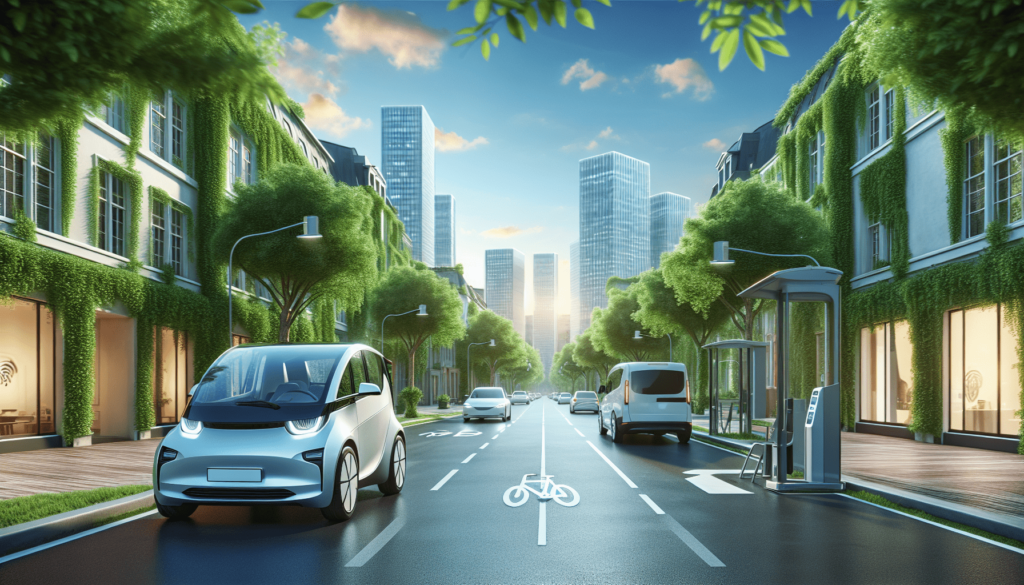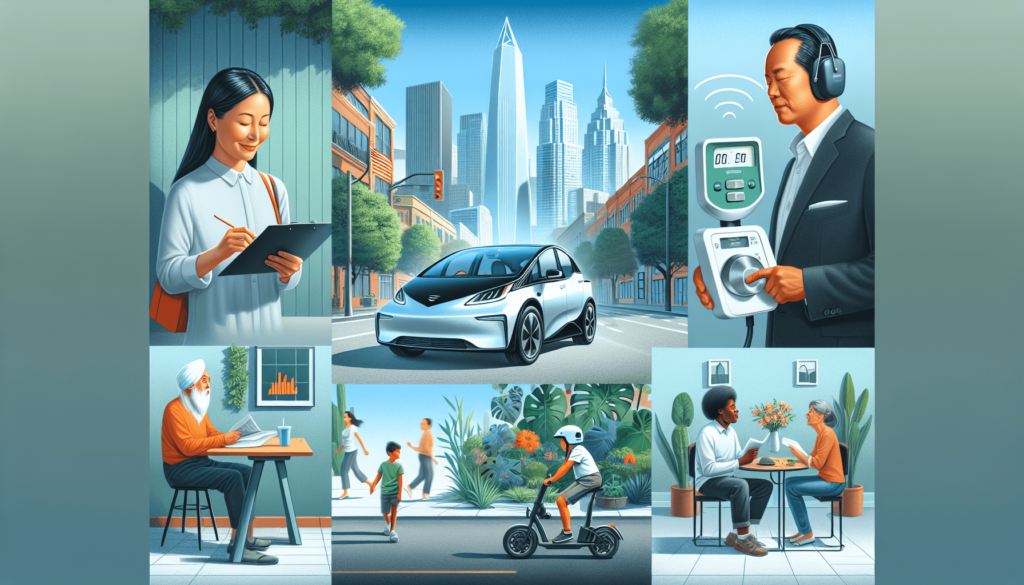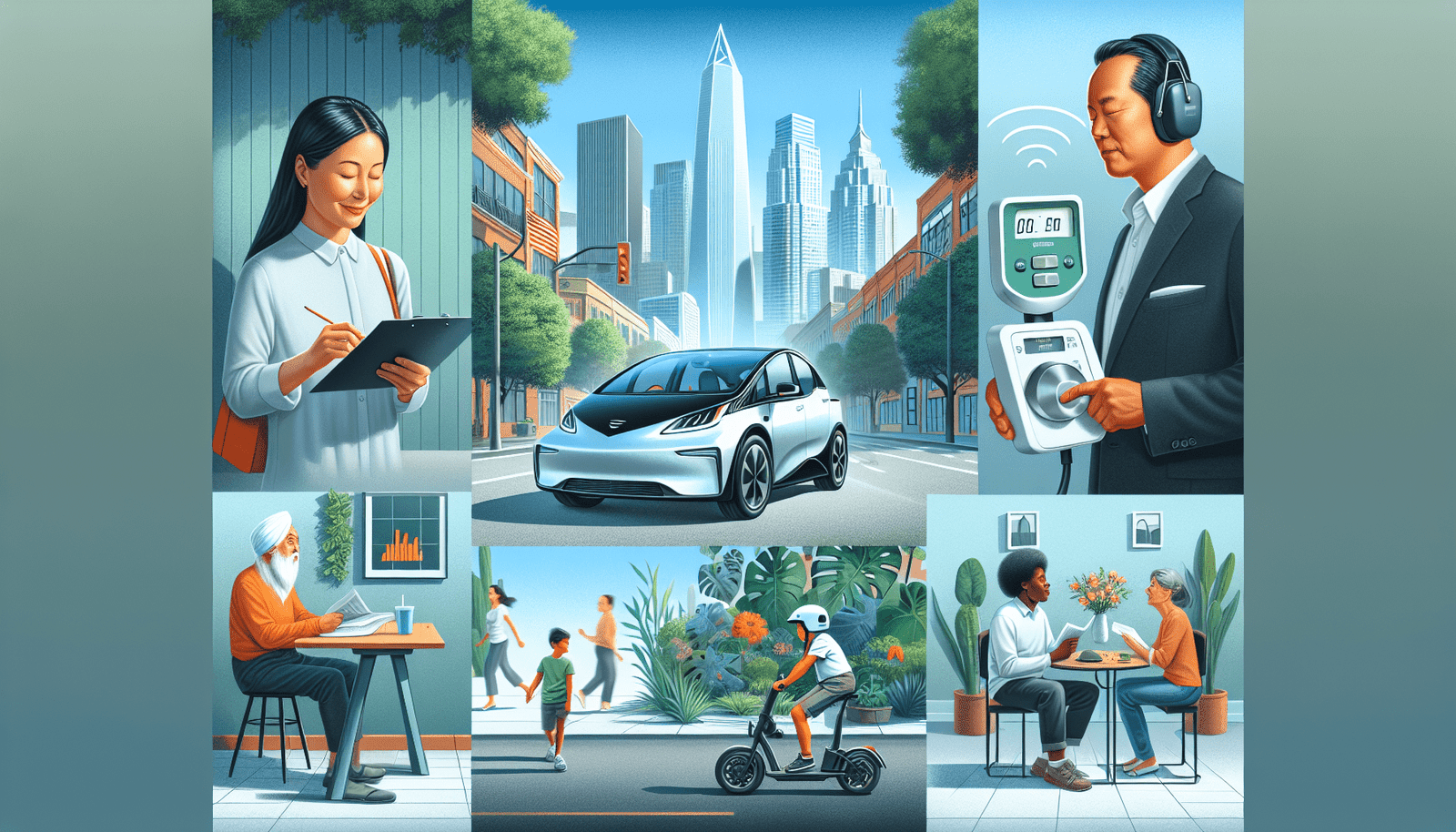Imagine living in a world where the honking of car horns and the rumbling of engines are distant memories, replaced by the gentle hum of electric vehicles gliding through the streets. It may sound like a sci-fi utopia, but it’s a future that could be within our grasp. Electric vehicles have the potential to revolutionize the way we travel, not only by minimizing carbon emissions but also by significantly reducing noise pollution. In this article, we will explore the various ways in which these silent eco-friendly machines can contribute to a quieter and more harmonious environment for all.

Electric Vehicles and Noise Pollution
Introduction to electric vehicles
Electric vehicles (EVs) are automobiles powered by one or more electric motors, generally using electrical energy stored in rechargeable batteries. Unlike traditional internal combustion engine vehicles that produce noise through their engines, EVs offer a quieter driving experience due to their quiet motor operation. This characteristic has significant implications for noise pollution reduction and its associated benefits.
The problem of noise pollution
Noise pollution refers to unwanted or excessive sounds that can have detrimental effects on human health and the environment. It is a growing concern in urban areas, where the constant exposure to high levels of noise can lead to hearing damage, stress, and increased risk of cardiovascular diseases. Traditional vehicles, particularly those powered by internal combustion engines, contribute significantly to noise pollution due to the combustion process and the noise generated by exhaust systems and moving mechanical components.
The relationship between electric vehicles and noise pollution
Electric vehicles have the potential to alleviate noise pollution and its detrimental impacts. The use of electric motors instead of combustion engines significantly reduces the noise emitted by vehicles, making them operate in near silence. This inherent feature of EVs presents a wide range of advantages in terms of noise pollution reduction, which we will explore in further detail.
Advantages of Electric Vehicles in Reducing Noise Pollution
Quiet operation
The most apparent advantage of electric vehicles in reducing noise pollution is their quiet operation. Unlike traditional vehicles that emit loud engine noises, EVs produce minimal noise, if any, during regular driving. This absence of engine noise not only provides a more pleasant driving experience for passengers, but it also contributes to a quieter urban environment, particularly in densely populated areas or during late-night and early morning hours.
Reduction in traffic noise
Traffic noise is a significant contributor to noise pollution in urban areas. It results from a combination of engine noises, tire friction, and aerodynamic forces acting on moving vehicles. Since electric vehicles operate silently, they contribute to a significant reduction in traffic noise levels. This reduction can lead to improved quality of life for residents, better sleep patterns, and decreased stress levels, ultimately benefiting overall public health and well-being.
Impact on urban areas
The reduction of noise pollution brought about by electric vehicles has a direct positive impact on urban areas. Quieter streets make outdoor activities, such as walking, cycling, or simply enjoying public spaces, more enjoyable. Additionally, the decreased noise levels can improve the ambiance of residential neighborhoods, encouraging community engagement and social interaction. The tranquil environment created by EVs also has positive implications for businesses, as it promotes a more pleasant shopping or dining experience for customers.
Technological Features in Electric Vehicles
Electric motors and noise reduction
One of the key technological features of electric vehicles that contributes to noise reduction is the use of electric motors. Electric motors operate silently and do not produce the loud engine noises associated with internal combustion engines. The absence of engine noise eliminates a significant source of noise pollution, providing a peaceful and serene driving experience. This technology, coupled with continuous advancements in motor efficiency and design, further enhances the noise reduction capabilities of electric vehicles.
Soundproofing and insulation
In addition to the quiet operation of electric motors, electric vehicles often incorporate soundproofing and insulation materials to minimize external noise intrusion. These materials are strategically placed in the vehicle’s construction to dampen vibrations and block sound transmission, resulting in a quieter interior cabin. This not only enhances passenger comfort but also reduces the need for excessive audio system volume, promoting energy efficiency and further contributing to noise pollution reduction.
Regenerative braking systems
Regenerative braking technology, commonly found in electric vehicles, allows them to recover and store energy that would otherwise be lost as heat during conventional braking. This technology has indirect noise reduction benefits. By allowing drivers to rely more on regenerative braking, which utilizes the electric motor to slow down the vehicle, EVs minimize the use of traditional friction brakes. Friction brakes generate noise through their mechanical operation, so the reduced reliance on them in electric vehicles contributes to overall noise pollution reduction.
Effects of Electric Vehicles on Human Health
Reduced exposure to noise pollution
The reduction in noise pollution resulting from the use of electric vehicles has significant health benefits for individuals. Continuous exposure to high levels of noise can lead to various health issues, including stress, sleep disturbances, cardiovascular diseases, and cognitive impairments. By minimizing the noise emitted during transportation, EVs reduce the overall noise exposure experienced by individuals, promoting better health outcomes and a higher quality of life.
Positive impacts on mental health
Noise pollution is known to have adverse effects on mental health, including increased stress, irritability, and reduced cognitive performance. Electric vehicles, with their near-silent operation, contribute to a calmer and less stressful environment. The absence of engine noise can improve mental well-being, allowing individuals to experience a greater sense of tranquility and relaxation during their daily commutes, which can positively affect their overall mental health.
Benefits for vulnerable populations
Vulnerable populations, such as the elderly, children, and individuals with sensory or cognitive impairments, are particularly susceptible to the detrimental effects of noise pollution. Electric vehicles offer these populations an opportunity for increased comfort and reduced stress by minimizing noise levels. Quieter streets and reduced traffic noise enable vulnerable individuals to navigate their surroundings with less disturbance, leading to enhanced safety, well-being, and overall quality of life.

Impact of Electric Vehicles on Environment
Reduction in overall noise pollution levels
Noise pollution is not only a concern for human health but also has adverse effects on various species and ecosystems. Electric vehicles play a crucial role in minimizing noise pollution levels, creating a more harmonious coexistence with nature. By reducing the noise emitted by transportation, EVs lower the overall noise levels in ecosystems, allowing wildlife to thrive without disruption, particularly in environmentally sensitive areas and habitats near roadways.
Protection of wildlife and ecosystems
High noise levels from transportation can have severe implications for wildlife, disrupting their communication patterns, breeding behavior, and feeding habits. Electric vehicles, with their quieter operation, mitigate these disruptions and contribute to the preservation of wildlife and ecosystems. The reduced noise impact allows animals to maintain their natural behaviors, promoting their overall well-being and ecological balance.
Contributing to sustainability goals
Electric vehicles not only offer noise pollution reduction benefits but also align with broader sustainability goals. With their reliance on electric power, they significantly reduce greenhouse gas emissions compared to traditional internal combustion engine vehicles. By promoting the adoption of electric vehicles, societies can reduce their carbon footprint and contribute to mitigating climate change while simultaneously reaping the noise pollution reduction advantages that come with electric transportation.
Economic Advantages of Electric Vehicles
Reduced healthcare costs
Noise pollution has been associated with various health issues, including cardiovascular diseases, mental health disorders, and sleep disturbances. By reducing noise pollution levels through the adoption of electric vehicles, societies can potentially reduce healthcare costs. The decreased prevalence of noise-related health issues may lead to a decrease in medical treatments, hospital admissions, and associated expenses, contributing to overall healthcare system efficiency.
Potential for noise reduction initiatives
The widespread adoption of electric vehicles creates an incentive for noise reduction initiatives in urban areas. With the reduced noise levels provided by EVs, municipalities may be motivated to invest in measures that further minimize noise pollution. This could include implementing noise barrier systems, limiting vehicle access to certain areas during specific hours, or introducing stricter noise emission regulations for vehicles overall. These initiatives would not only enhance noise reduction efforts but also contribute to the overall well-being and livability of cities.
Attracting tourism and investment
Electric vehicles and their impact on noise pollution can also have economic advantages for cities and regions. By prioritizing noise reduction through the adoption of electric vehicles, cities can market themselves as quiet and sustainable destinations, especially for tourists seeking peaceful and environmentally friendly experiences. Additionally, businesses and investors are increasingly interested in environmentally conscious practices, and regions that prioritize electric vehicle adoption and noise reduction initiatives may attract investment, creating economic opportunities and improving local economies.
Challenges and Limitations of Electric Vehicles in Noise Reduction
Infrastructure requirements
One of the challenges associated with electric vehicles in noise reduction is the infrastructure required to support their adoption. EVs rely on a network of charging stations for battery recharging, and the availability of these stations is not yet as prevalent as traditional fueling stations. The expansion of charging infrastructure is necessary to facilitate widespread electric vehicle use and ensure their noise reduction benefits can be realized. Without a comprehensive charging network, the noise pollution reduction potential of electric vehicles may be hindered.
Cost and access to electric vehicles
Another limitation to consider is the cost and accessibility of electric vehicles. While prices have been decreasing over time, electric vehicles can still be more expensive than their internal combustion counterparts. This pricing disparity may limit the ability of some individuals or communities to adopt electric vehicles, hindering the noise reduction benefits they offer. Additionally, access to charging infrastructure, particularly in rural or low-income areas, may limit the viability and widespread adoption of electric vehicles in noise pollution reduction efforts.
Resistance to change
The adoption of electric vehicles and the implementation of noise reduction measures may face resistance from various stakeholders. This resistance can be due to concerns about the practicality of electric vehicles, perceived limitations in their performance compared to traditional vehicles, or reluctance to adjust to new technologies. Overcoming this resistance requires education, public awareness campaigns, and addressing misconceptions surrounding electric vehicles and their noise reduction potential.
Government Policies and Initiatives
Support and incentives for electric vehicle adoption
Government policies and initiatives play a crucial role in promoting the adoption of electric vehicles and encouraging noise pollution reduction efforts. Many countries have implemented a variety of incentives, including financial grants, tax rebates, and subsidies, to make electric vehicles more affordable and appealing to consumers. These policies aim to accelerate the transition to electric transportation, reduce noise pollution, and achieve broader sustainability objectives.
Noise pollution regulations
To effectively address noise pollution, governments can implement strict noise emission regulations for vehicles. By establishing standards that limit the permitted noise levels for cars, trucks, and motorcycles, governments can ensure that noise pollution is reduced and controlled. These regulations, combined with noise enforcement programs, encourage manufacturers to develop quieter vehicles, further supporting noise pollution reduction measures.
Investment in charging infrastructure
The successful integration of electric vehicles into noise reduction strategies also relies on the development of adequate charging infrastructure. Governments can invest in the expansion of charging networks, ensuring that electric vehicle owners have access to convenient and reliable charging options. By supporting the establishment of charging stations in public spaces, workplaces, and residential areas, governments can remove barriers to electric vehicle adoption and facilitate the noise reduction benefits intrinsic to electric transportation.
Research and Development
Advancements in noise reduction technology
Ongoing research and development in noise reduction technology contribute to the continuous improvement of electric vehicles’ noise pollution reduction capabilities. Innovations in electric motor design, soundproofing materials, and vehicle aerodynamics aim to further minimize the noise emitted by electric vehicles. These advancements offer potential benefits not only in noise reduction but also in overall vehicle performance and efficiency, providing additional incentives for individuals to choose electric vehicles.
Improving battery efficiency
Enhancing battery efficiency is a crucial area of research in electric vehicle development. By improving battery technology, researchers aim to extend vehicle range and reduce charging time, addressing one of the main concerns associated with electric vehicles. Longer range capabilities and shorter charging times may encourage more individuals to transition to electric vehicles, thereby maximizing the noise pollution reduction potential of electric transportation.
Integration of renewable energy sources
Research and development efforts in electric vehicles also focus on integrating renewable energy sources to power these vehicles. By utilizing renewable energy, such as solar or wind power, electric vehicles can further reduce their environmental impact and associated noise pollution. This integration maximizes the sustainability benefits of electric transportation, aligning with broader objectives in mitigating climate change and transitioning toward a cleaner and quieter future.
Conclusion
The potential of electric vehicles in reducing noise pollution is substantial and multifaceted. With their quiet operation, electric vehicles offer a solution to the increasing concerns about noise pollution’s impact on human health, the environment, and overall well-being. The advantages of electric vehicles in reducing noise pollution include quiet operation, a reduction in traffic noise, positive effects on mental health, benefits for vulnerable populations, a decrease in overall noise pollution levels, protection of wildlife and ecosystems, economic advantages, and contributions to sustainability goals. However, challenges and limitations exist, such as infrastructure requirements, cost and accessibility, and resistance to change. Governments play a critical role in supporting the adoption of electric vehicles through initiatives, noise pollution regulations, and investments in charging infrastructure. Research and development efforts continue to advance noise reduction technology, improve battery efficiency, and integrate renewable energy sources, further enhancing the potential of electric vehicles in noise pollution reduction. Continued research, support, and policy measures are crucial to fully realize the benefits and address the challenges of electric vehicles in reducing noise pollution.

